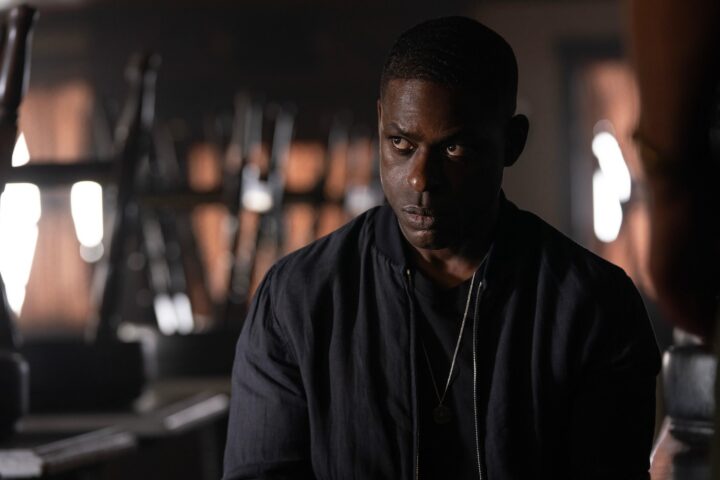If mainstream American comedy feels like it’s on the ropes at the moment, American satire certainly seems to be in a permanent flatline. It’s not so much that audiences aren’t primed for a fight. Rather, the question is how far do you have to push into absurdity before it registers as an exaggeration in our particular cultural moment? And, even if a modern-day Jonathan Swift managed to score a direct hit on the level of A Modest Proposal, would it not be instantaneously met with a chorus of quote tweets pointing out that it’s actually a moral failing to even entertain the idea of cooking and consuming infants for dinner as a joke?
You wouldn’t assume that an audience award winner at the Toronto International Film Festival would buck this trend, and you’d be right. Writer-director Cord Jefferson’s American Fiction doesn’t come even close. Yet one could easily imagine its central character, the frustrated Black writer Thelonius “Monk” Ellison (Jeffrey Wright), pondering the very same roadblocks outlined above when, one liquor-ridden evening midway through the film, he unloads an entire lifetime’s worth of personal and professional resentment into an act of holier-than-thou bad faith.
Ellison is first seen moonlighting in California as an adjunct professor of English literature, grimacing his way through a cartoonishly woke session on short stories, during which one student—a white woman—refuses to let Ellison get away with making his class read the Flannery O’Connor’s story with the n-word in its title. No room for discussion, no curiosity for context, just flat-out rejection—which is exactly what the school administration offers Ellison himself after his ensuing outburst pricks said student’s protective bubble. (It doesn’t help matters that Ellison, on his way out, attacks one of his colleagues’ literary output as worthless.)
Ellison is about to dive into a spiral of self-pity. At one point, he’s shown plucking the few books that he’s managed to publish off the “Black voices” shelf and arguing with a store clerk that, though he’s a Black writer, his books aren’t about Blackness. But just as he’s on the precipice, he’s summoned back to New England to attend to pressing family matters he’s been neglecting for years. And, on the side, to attend a writers’ convention where the hot young author Sinatra Golden (Issa Rae) is dazzling the cognoscenti with her new novel We’s Lives in Da Ghetto, a none-too-thinly veiled parody of Sapphire’s Push. As his public and private frustrations come to a head, Ellison decides to pen a deeply contemptuous burlesque of what he (justifiably) believes audience of all backgrounds demand from Black narratives in America. His title? My Pafology.
Jefferson brings to this adaptation of Percival Everett’s 2001 novel Erasure a surprisingly even hand and a seemingly incompatible generosity of spirit to the material. Whereas Everett’s novel included, at length, the ample text of Ellison’s vituperative labor, American Fiction limits audiences to a few brief fantasy glimpses enacted, as though a waking dream, by actors in Ellison’s writing room, thereby keeping comfortably off screen the full brunt of Ellison’s salvo.
In its place, and forming the bulk of the film’s runtime, are scenes showing Ellison reconnecting with his Alzheimer’s-suffering mother (Leslie Uggams), his harried professional sister (Tracee Ellis Ross), and his newly out-of-the-closet himbo brother (Sterling K. Brown), rebuilding bridges that he thought he demolished years ago. And, as Ellison tentatively navigates the beginning of a midlife relationship with a mature, confident equal (Erika Alexander), it’s hard not to detect a whiff of Alexander Payne’s Sideways in the bouquet. But where Payne’s film embodies the meme that “men will literally use their priceless 1961 Cheval Blanc to wash down a Clown Burger meal than go to therapy,” American Fiction shows Ellison putting in the work.
A generous argument might even posit that Ellison’s screed is the result of what any reasonable therapist would recommend: putting it all on the page. It’s only when his agent, Arthur (John Ortiz), who’s as starved for a hit as the author himself, reports back to Ellison that My Pafology is caught up in a bidding war does American Fiction finally start to embrace its dual identity as a broad satire of America’s cultural caste system for the way it keeps its minority artists in creative purgatory, endlessly salving white liberal guilt.
But even then, Jefferson often and deliberately shifts the focus back on Ellison’s path to salvation: his family, his love, and his community. Some critics have speculated that time has taken a bit of the bite from Everett’s original attack, but I’d argue that such detritus as Hillbilly Elegy and American Dirt only proves the elite beast’s voracious appetites will never be quelled and will just keep expanding alongside the New York Times’s Sunday opinions section.
Without spoiling its increasingly ludicrous (and ludicrously believable) escalations, American Fiction ultimately gets off scot-free clinging doggedly to the middle ground. And even if it, as Vulture critic Alison Willmore has noted, comes to resemble the sort of upper-class comedy of errors that Ellison himself wishes were commonplace on “Black voices” shelves, and not typo-ridden poverty porn like My Pafology, the film’s final flourish on a Hollywood set manages to wistfully suggest that both things can coexist in something resembling harmony.
Since 2001, we've brought you uncompromising, candid takes on the world of film, music, television, video games, theater, and more. Independently owned and operated publications like Slant have been hit hard in recent years, but we’re committed to keeping our content free and accessible—meaning no paywalls or fees.
If you like what we do, please consider subscribing to our Patreon or making a donation.







I actually felt the movie hit the nail on the head of the unfortunateness of what we, as the white population, see in “black and white.” I enjoyed the movie as a pretty true perception, sadly. But also enjoyed the satire of it.